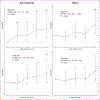Glycaemic variation is a predictor of all-cause mortality in the Veteran Affairs Diabetes Trial
- PMID: 31014099
- PMCID: PMC7380497
- DOI: 10.1177/1479164119827598
Glycaemic variation is a predictor of all-cause mortality in the Veteran Affairs Diabetes Trial
Abstract
Diabetes is associated with substantially increased mortality. Classic risk factors explain a portion of the excess of mortality in type 2 diabetes. The aim of this study was to examine whether visit-to-visit variation in fasting glucose and haemoglobin A1c values in the Veteran Affairs Diabetes Trial were associated with all-cause mortality in patients with type 2 diabetes in addition to other comorbidity conditions, hypoglycaemic events and adverse lifestyle behaviours. The Veteran Affairs Diabetes Trial was a randomized trial that enrolled 1791 military veterans who had a suboptimal response to therapy for type 2 diabetes to receive either intensive or standard glucose control. During the Veteran Affairs Diabetes Trial, fasting glucose and haemoglobin A1c were measured quarterly for up to 84 months. Variability measures included coefficient of variation and average real variability. We found that variability measures (coefficient of variation and average real variability) of fasting glucose were predictors of all-cause mortality, even after adjusting for comorbidity index, mean fasting glucose and adverse lifestyle behaviour during the study. Accounting for severe hypoglycaemia did not weaken this association. Our analysis indicates that in the Veteran Affairs Diabetes Trial, longitudinal variation in fasting glucose was associated with all-cause mortality, even when accounting for standard measures of glucose control as well as comorbidity and lifestyle factors.
Keywords: Mortality; glycaemic control; hypoglycaemia; long-term glycaemic variability; type 2 diabetes.
Conflict of interest statement
Declaration of conflicting interests
The author(s) declared no potential conflicts of interest with respect to the research, authorship and/or publication of this article.
Figures

References
-
- Wang SL, Head J, Stevens L, et al. Excess mortality and its relation to hypertension and proteinuria in diabetic patients. Diabetes Care 1996; 19: 305–312. - PubMed
-
- Wei M, Gaskill SP, Haffner SM, et al. Effects of diabetes and level of glycemia on all-cause and cardiovascular mortality. Diabetes Care 1998; 21: 1167–1172. - PubMed
-
- de Marco R, Locatelli F, Zoppini G, et al. Cause-specific mortality in type 2 diabetes. Diabetes Care 1999; 22: 756–761. - PubMed
-
- Ford ES and DeStefano F. Risk factors for mortality from all causes and from coronary heart disease among persons with diabetes. Am J Epidemiol 1991; 133: 1220–1230. - PubMed
Publication types
MeSH terms
Substances
Grants and funding
LinkOut - more resources
Full Text Sources
Medical

